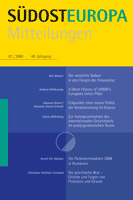Regionale Aussöhnung und Stabilisierung durch Recht? Zur aktuellen Inanspruchnahme des Internationalen Gerichtshofs im postjugoslawischen Raum
Regional Reconciliation and Stabilization via Law? Current Claiming of the International Court of Justice in the post-Yugoslav Region
Author(s): Sabine WillenbergSubject(s): Politics / Political Sciences
Published by: Südosteuropa Gesellschaft e.V.
Summary/Abstract: The International Criminal Tribunal for the Former Yugoslavia ICTY and the International Court of Justice ICJ, the two most prominent international courts dealing with the post-Yugoslav states, both based in The Hague, address open questions left to the Yugoslav successors by the past of World War II, Tito-Yugoslavia and its disintegration and the wars of the 1990s. Only ICTY was given a mandate to contribute to coming to terms with the past by bringing the war crimes committed in the 1990s to court. Nevertheless, ICJ more and more often appears when it comes to judging open questions of the past: The Yugoslav successors discovered the ICJ for their concerns, reinvented its function and compete with lawsuits – for genocide, borders, names or Kosovo’s independence. The article follows the question whether international jurisdiction and the extensive claiming of the ICJ by the Yugoslav successors contribute to a constructive dealing with the past and reconciliation in the region. It argues that juridical coming to terms with the past can only be effective when being interconnected with the societal dimension, where awareness of injustice must be reached and communicated. Otherwise, international justice runs the risk of degenerating into mere, but striking foreign policy instruments and even intensifying the conflict.
Journal: Südosteuropa Mitteilungen
- Issue Year: 2009
- Issue No: 01
- Page Range: 50-63
- Page Count: 14
- Language: German
- Content File-PDF

